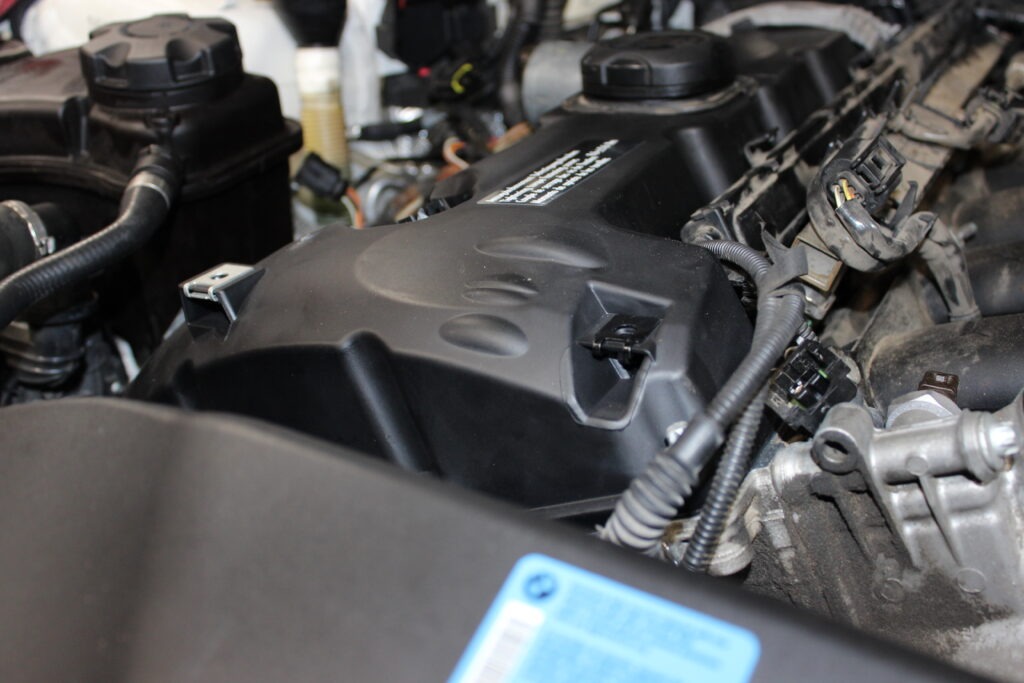BMW Valve Cover Repair in Seattle
Have you ever smelled a burning odor after a spirited drive? If so, you might have developed an oil leak. One of the most common places for your BMW to leak oil is from the valve cover. Precision Motorworks understands the ins and outs of BMWs, and is your trusted BMW repair specialist when it comes to valve cover failure.
What is the Valve Cover?
On most modern BMWs, the valve cover is a plastic composite cover, whereas older models utilize a much simpler metal assembly with a rubber gasket. The valve cover is responsible for sealing the valvetrain from outside debris and for keeping essential lubricating oil in. On today’s BMW engines, the valve cover also serves an important secondary purpose: containing a pressure regulating diaphragm and, in some cases, an air/oil separator for the PCV (Positive Crankcase Ventilation) system.
Why Valve Covers Fail
There are many reasons that BMW engines are synonymous with valve cover issues, but the correlation is mainly due to its plastic composition and intense thermal load. The valve cover is not subjected to high pressure oil in the same way that the oil filter housing gasket is, but it is exposed to high temperatures and many cold-to-hot-to-cold heat cycles over the life of the vehicle. Furthermore, BMW chooses to produce their valve covers in a “plastic” (glass fiber reinforced nylon) composition. Due to this, over many heat cycles, the valve cover will warp, no longer effectively sealing oil inside the engine. In contrast to this, many older BMW engines use a metal valve cover, which will often last the life of the vehicle, only require periodic gasket changes, and do not contain any complicated pressure regulation equipment.

Common Valve Cover Failure Symptoms
Often the first symptom a driver notices when they have a valve cover leak is a distinctive burning smell. In some severe cases, smoking will occur and can end up in the cabin due to its proximity to the cabin air intake. This is because the exhaust system is located directly below the valve cover on one side of the engine. Any leakage on that side can trail onto the exhaust and burn off as it gets hot, creating smoke and an oil smell. BMW’s integration of the pressure control diaphragm and air/oil separator on some engines adds complication to the valve cover. Some cases of PCV failure may warrant complete valve cover replacement.
Schedule a Valve Cover Inspection Today
Issues with your valve cover, especially oil leakage, will often start slowly. There is a threshold of oil leakage that can be safely monitored. However, once oil starts contaminating other external components, the risk of complications warrants timely replacement of the valve cover. Whenever you bring your BMW to Precision Motorworks, the valve cover is one of the first things we look at. We assign a severity rating to any leakage we see, which allows you time to plan for upcoming repairs before they require immediate attention. In some cases, failures of the crankcase ventilation components internal to the valve cover can trigger a check engine light or cause rough running, seemingly out of the blue. It is important to address these issues with promptness since improper operation of this system can lead to oil consumption, oil leakage, poor runnability, and reduced fuel economy. Regardless of what issues your BMW has, Precision Motorworks are your local Seattle BMW experts you can trust to take care of all problems, big or small.

